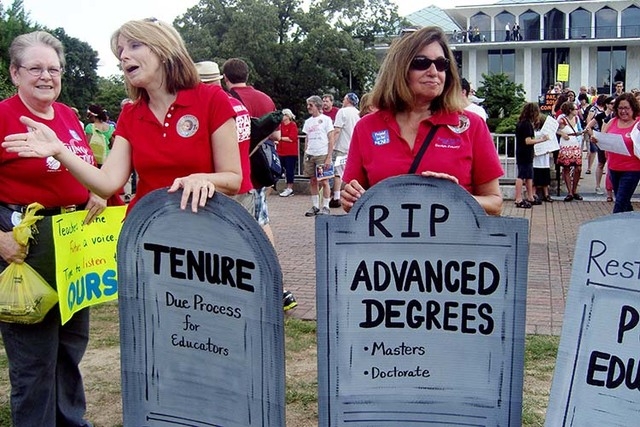Higher teacher pay for higher degrees debated

DALLAS — Efforts to eliminate extra pay for teachers who earn advanced degrees are gaining momentum in a small but growing number of U.S. schools, stirring a national debate about how best to compensate quality educators and angering teachers who say the extra training is valuable.
More than half of the nation’s teachers have master’s degrees or higher, but the changing salary structure is giving pause to others considering the same path. Texas’ two largest school districts, in Houston and Dallas, recently eliminated advanced degree pay going forward, following the example of North Carolina, where lawmakers last year started phasing it out. A few other states have made tweaks to reduce how much advanced degrees factor into pay.
“They’re trying to say there’s no value at all for a teacher going back to increase their knowledge,” said Rena Honea, president of Alliance-AFT, which represents Dallas Independent School District employees. “Just by having the additional knowledge in their content area gives them more tools in their toolbox to be able to reach the different types of learners that are in the classroom.”
Those championing dropping the extra pay say advanced degrees don’t necessarily translate into better student test scores. They say the money is better spent elsewhere, such as on rewarding teachers deemed most effective in the classroom.
“Effectiveness is more based on results rather than any checklist of things,” said Dallas Superintendent Mike Miles, who implemented a pay-for-performance system in the district, as he did at his previous district in Colorado. “So years of service and the advanced degrees are checklist-type things.”
Yet the backlash in North Carolina grew so intense that the state is now looking at reinstating the extra pay for those teaching classes related to the subject in which they have an advanced degree. It’s among teacher pay issues lawmakers are considering this summer.
In April, the Wake County Public School System — the largest in North Carolina with about 150,000 — said more than 600 teachers had left since the beginning of the school year, an increase of 41 percent over the same period the year before.
One district official blamed a lack of a significant pay raise in recent years along with the phasing out of tenure and extra pay for advanced degrees. Human Resources Superintendent Doug Thilman called the figures “alarming” but “not surprising.”
Tim Barnsback, who teaches an engineering program at a middle school in Burke County, N.C., is among educators who have put off pursuing an advanced degree until the situation is resolved.
“Intellectually and professionally, it still interests me and makes a lot of sense,” Barnsback said. “But economically, it doesn’t make any sense to do it anymore.”
The extra pay for having a master’s degree in North Carolina accounted for 10 percent of a teacher’s base salary from the state. In the Houston and Dallas school districts, the extra pay started at about $1,000 more annually for first-year teachers.
Dallas’ new system is based on evaluations, with classroom performance accounting for half, test scores for 35 percent and student surveys making up 15 percent. In Houston, the school district board gave teachers a raise of at least $1,100 and bumped starting pay from nearly $47,000 to $49,100. In both districts, teachers already earning extra pay for advanced degrees won’t see their salaries drop.
One matter of debate is whether the extra training translates to better student test scores.
“We’ve built these salary structures based on years of experience and advanced degrees, and both turned out to be not very good indicators of teachers’ performance,” said Sandi Jacobs, vice president of the National Council on Teacher Quality.
While opponents of the pay perks point to studies that show the advanced degrees don’t make teachers more effective, Gary Henry, an education researcher with Vanderbilt University, says many show mixed results, with effectiveness proven in one subject matter but not others.
“I don’t think the research is definitive enough to make the broad kinds of changes that are being made in teachers’ salaries,” he said.
In Texas’ third-largest school district, Cypress-Fairbanks, Superintendent Mark Henry said he has no plans to consider any change that would discourage teachers from going back to college.
“I think what we tell children all the time, and what we tell each other, is to be lifelong learners,” he said.












